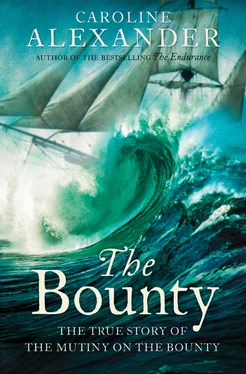Although Selkirk did not disclose the fact, he was an old friend of Bligh’s father-in-law, Richard Betham, and it is probable that he had been leaned upon to communicate family concerns to Banks. These concerns were openly expressed in the farewell letter Betham himself wrote to Bligh a week later, offering his good wishes for the long voyage ahead: ‘I own I have a different Idea of [the voyage] from what I had conceived before I was acquainted with the Circumstances of the Vessel, & the manner in which it is fitted out,’ he told his son-in-law. ‘Government I think have gone too frugally to work: Both the Ship and the Complement of Men are too small in my opinion for such a voyage. Lord Howe may understand Navy matters very well, but I suppose mercantile Projects are treated by him with Contempt.’
‘Contempt’ is perhaps too strong a word; but the accumulation of troubling details – the miserably small ship, the determinedly lower rating, Bligh’s own status and the apparent lack of urgency in getting sailing orders – tend to suggest that collecting breadfruit in Tahiti was not at the top of the Admiralty’s list. Among other things, England seemed poised for yet another war, this time with Holland.
‘Every thing here wears the appearance of War being at hand,’ Duncan Campbell had written to a Jamaican colleague on 29 September. ‘Seaman’s Wages & every naval Store have of course risen to War prices.’ To an Admiralty intent on mobilizing ships and men, the Bounty’s breadfruit run to the Pacific was only a distraction. Three weeks would pass before Bligh received his sailing orders, by which time the fair conditions had changed.
On 28 November 1787, Bligh headed the Bounty out to sea, and got as far as St Helens on the Isle of Wight, an inconsequential distance, where he was forced to anchor. For the next twenty-four days, the Bounty bounced between Spithead and St Helens as each successive attempt to get down Channel failed in the teeth of contrary winds. Master Fryer and William Peckover, the gunner, were laid up by the bad weather with ‘rheumatic complaints’ and a number of his men had severe colds. Resentment and anxiety that had been mounting in Bligh for months rose to the fore.
‘If there is any punishment that ought to be inflicted on a set of Men for neglect I am sure it ought on the Admiralty for my three weeks detention at this place during a fine fair wind which carried all outward bound ships clear of the channel but me, who wanted it most,’ Bligh fumed in a letter to Duncan Campbell. It was 10 December, and he was back at St Helens, pinned in the cabin. This has made my task a very arduous one indeed for to get round Cape Horn at the time I shall be there. I know not how to promise myself any success and yet I must do it if the ship will stand it at all or I suppose my character will be at stake. Had Lord Howe sweetened this difficult task by giving me promotion I should have been satisfied.’
The question of promotion worried Bligh grievously. At the very least, as he had written to Banks, ‘that one step would make a material difference to Mrs. Bligh and her children in case of any accident to me.’ Moved by Bligh’s entreaties, Banks personally approached Lord Howe, the revered First Lord of the Admiralty, but without success, being told such advancement ‘was designed intirely as a reward to those who had engaged in the War equipment’; in other words, breadfruit expeditions did not count.
The hardship I make known I lay under, is that they took me from a state of affluence from your employ,’ Bligh continued, unburdening himself to Duncan Campbell, ‘with an income five hundred a Year to that of Lieut’s pay 4/- per day to perform a Voyage which few were acquainted with sufficiently to ensure it any degree of success.’
But interest had gone as far as it could. Meanwhile, if war was indeed at hand, this would be the occasion for promotions, although not for Lieutenant Bligh, off in the Pacific.
‘Poor fellow,’ Campbell would say of Bligh, somewhat later. Ignobly batted back and forth across the Channel entrance, Bligh, while not quite getting cold feet, was clearly assessing the risks of the voyage to which he was committed. Low pay was to have been compensated by promotion and the prestige of the undertaking; but there was no promotion and the prestige had already evaporated. Frustrated, demoralized, already tested by the weather, Bligh had not yet even left England.
‘It is wished to impress it strongly on your mind that the whole success of the undertaking depends ultimately upon your diligence and care,’ Banks wrote in an oppressively stern letter to the poor gardener David Nelson – but the warning applied equally to Bligh. ‘And that your future prospects in life will greatly depend upon your conduct on this occasion.’
One person on board, at least, benefited from the delay in the Bounty ’s departure. Thanks to the rough weather, Fletcher Christian was able to meet his brother Charles, who had recently returned to England on the Middlesex , the East Indiaman on which he had been ship’s surgeon.
‘When the Middlesex returned from India, the Bounty lay near to where she was moored,’ Charles Christian recounted in an unpublished memoir many years later. ‘Fletcher came on Board coming up the River, and he and I and one of our Officers who had been in the Navy went on Shore, and spent the Evening and remained till next Day.’ There were family matters to discuss; their sister Mary had died in her twenty-sixth year, more than eighteen months before; their youngest brother, Humphrey, was soon to go to Africa. Doubtless, too, the brothers conferred over family finances. Things were looking up for Fletcher who, returned from the West Indies, could report that he was now off to Tahiti, with Cook’s sailing master.
But all of this was overshadowed by the news Charles Christian had to tell his younger brother. Certain events had transpired on the Middlesex that had shaken him to his core – indeed, they were eventually to lead to his mental breakdown. Two weeks before the arrival of the Middlesex in England, Charles Christian had been involved in a mutiny.
Trouble had begun as early as Fort Saint George, in Madras. David Fell, the second officer, claimed that he had been unlawfully confined on the ship, and that the governor of the fort had interceded and ordered him released. The Company’s surviving records tend to bear this out, showing that in July 1787 the Directors praised the governor for the ‘manner in which you interfered in the Disputes on board the Middlesex.’
The real trouble came to a head two months later, however, as the ship approached English shores. On 5 September, according to the log of Captain John Rogers, Mr Grece, seaman, was placed in irons ‘for Presenting a Loaded Pistol to my Breast with a threat that he would put the first Man to death who would offer to touch him.’ The first and second officers attempted to aid John William Grece and were dismissed ‘for aiding & assisting in the above Mutinous Conspiracy’ as well as ‘for Drunkeness, Insolent Language & striking at me on the Quarter Deck…The Surgeon also in the Conspiracy.’
Two days later, George Aitken, the dismissed first officer, came on deck when Captain Rogers was present, an action the captain interpreted as hostile. Calling on his other officers, Rogers had Aitken and David Fell confined below, ‘battened them both in their Cabbins,’ with a scuttle cut in the door for air. Twelve days later, the Middlesex reached the Downs, the sheltered anchorage between Dover and the Thames estuary.
The captain’s log, however, did not give the entire story. Upon return to England, the Middlesex officers and men sent a stream of furious and aggrieved letters to the East India Company’s Court of Directors, charging Captain John Rogers with brutal conduct.
Читать дальше












